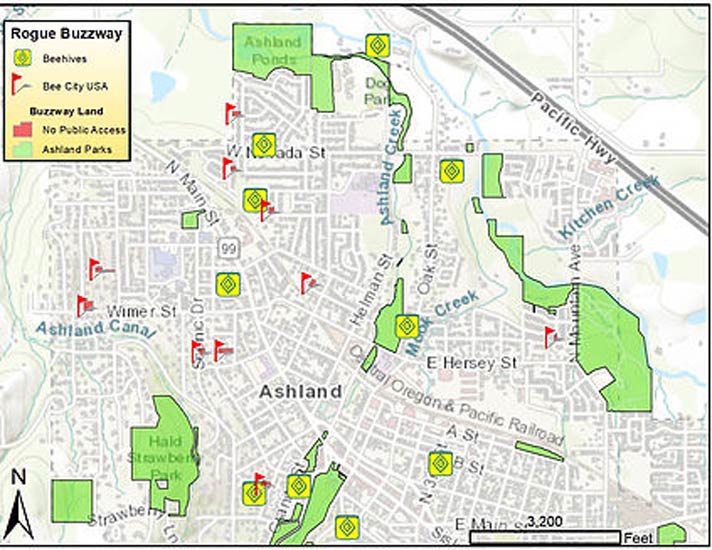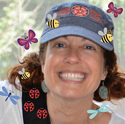Love Thy Pollineighbor – April 2018
There’s a lively and colorful movement growing here in Southern Oregon, and it embodies beauty and environmental stewardship with an intention to reverse pollinator decline.
It’s the Rogue Buzzway project sponsored by Pollinator Project Rogue Valley (PPRV), and you can bee a part of it. The Buzzway is a map of local pollinator-friendly gardens and landscapes that highlights the pollinator corridors throughout the Rogue Valley. These corridors provide contiguous safe havens for butterflies, bumble bees, native bees, honey bees, hummingbirds, and other pollinators.
A Pollinator-Friendly Landscape Provides:
- Forage—flowering plants blooming continuously from early spring to early winter
- Water (for bees) or mud (for butterflies)—river, spring, seep, or stream, a shallow, pebble-lined dish, bird bath or other water feature
- Habitat—untended or wild areas with bare soil, shrubs and native plantings for nesting and overwintering bees, butterflies, and other pollinators
- Pesticide-Free Areas—seeds and plants not treated with pesticides. Be a pollinactivist and ask your local nursery if they use any synthetic pesticides on their plants.
Go Native!—For over 170 million years, hundreds of pollinator species in Southern Oregon have co-evolved with our native trees, shrubs, and flowers. Native plants provide the necessary nourishment and habitat for our native pollinators, and they are best adapted to our climate and soil, thus easier to grow.
I asked Kristina Lefever, President of PPRV, what is the main benefit of being on the Buzzway map?
“Identifying your property as pollinator-friendly and adding it to the map creates a buzz to build awareness and inspire others to help save the pollinators. Whether you are a homeowner, a renter, or a business, everyone can create pollinator habitat on their property—large or small. It all counts. We aren’t talking about pristine, well-tended gardens like what you may see in a magazine. On the contrary, we want people to grow plants that bloom all year long but also to leave undisturbed areas for ground-nesting pollinators, like bumblebees. So having a relaxed stance about the state of your garden or landscape is a very good thing.
Also important is to identify where pollinator habitat isn’t. Because then our job is to think about how we can fill in the gaps. This is where local groups, like garden clubs, can help create and encourage habitat so the entire valley is brimming with pollinators.”
Show off your pollinator-friendly property and join me to help put Jacksonville on the Buzzway map! Learn more at https://www.pollinatorprojectroguevalley.org/rogue-buzzway-project.

 When she’s not working, volunteering, fiddling about the garden, photographing nature, being a pollinactivist, blogging about social and environmental justice, or pawning her eco-children’s book, Kenda, a former Monarch butterfly docent, gets her kicks hanging with her husband, her dog, and the pollineighbors.
When she’s not working, volunteering, fiddling about the garden, photographing nature, being a pollinactivist, blogging about social and environmental justice, or pawning her eco-children’s book, Kenda, a former Monarch butterfly docent, gets her kicks hanging with her husband, her dog, and the pollineighbors.
Thank you very much, Kenda! Great article! :-) <3
And we are looking forward to the JCC Pollinator Garden! We know it will bee on the Buzzway!